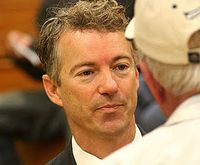Think of this as Volume 14, Number 22 of A-Clue.com, the online newsletter I've written since 1997. Enjoy.
 Principles are good. They are important. I wouldn't want someone involved in politics without them.
Principles are good. They are important. I wouldn't want someone involved in politics without them.
Ideology, on the other hand, is bad. It's anti-democratic, because it doesn't allow for facts or disagreement. (You can buy this picture as a poster. I've made it small as an ad for the poster company.)
Ideology can destroy principles, turning them ugly, making them murderous. It doesn't matter what the principles are. The ideas of Karl Marx, that we should all treat one another with decency, that no one should be left behind, made perfect sense until they were turned into an ideology. The same was true of most 19th century German philosophy, until these principles were turned into ideologies. Then we had war, and mass murder, and genocide, and madness.
The same is true for American principles. Turn them into ideology — turn any of them into ideology — and they become destructive. Democracy seen as ideology led us to Vietnam and Iraq. Capitalism turned into ideology led to Bushism.
Every crisis in American history has caused people to seek new principles, and turned those principles into ideology. It's the hardening of principles, a natural political arteriosclerosis, which creates these ideologies. It also leads to their rejection. It's why we have such a circular political history, a generational metronome marking our progress.
The great political turns in American history have come when we recognized principle becoming ideology. We rejected it in an election, but the extreme believers in that ideology kept going, forward in their own minds, becoming caricatures of themselves. Fortunately, the American people have been wise enough over 200 years not to follow.
So who's Abbie Hoffman now?
Libertarian principles have been in the process of becoming an ideology for over a generation. Rand Paul is a true son of his father, Ron Paul, only without Ron Paul's charm and delicacy. (When your first name is the last name of Ayn Rand, it's obviously something you're born to.)
Ideology attracts during a time of crisis because it is certain. It is absolute. It admits no error. It cannot fail. Its followers can only fail it. Thus any mistake is explained away, those who erred in the name of ideology are forgotten.
It's politics as religion, and most every religion I know of practices a form of ideology. It's a willful blindness that won't admit to pedophilia or condemn a bloody bombing, that won't acknowledge the basic humanity of those whose principles are different, or more complex. Ideology dehumanizes both its practitioners and those it then victimizes. In every case.
Ideologies usually emerge from our best principles, the better angels of our nature placing one value above all others. Hoffman came from principles of tolerance and equality. Who can be against that? Paul's principles are freedom and liberty. Excellent principles.
But in both cases, horrid ideologies.
The reason our Constitution has remained in force for 220 years, many generations more than our Founders believed it could, is because Americans have always shown the wisdom to choose principles over ideology. The Constitution and its principles are constantly re-interpreted, adjusting to fit the times and the problems of the moment, as good principles do.
No ideology, even one that claims to descend from the Founders, can ever do that.
Our greatest leaders have always used the argument of better angels to move us toward pragmatism, toward principles over ideology, until their success, and the success of what they stood for, in turn becomes an ideological, unable to answer the problems of the next generation. Lincoln did that. Roosevelt did that. Obama does that. Each crisis leader has faced ideological opponents whose hatred was fierce and who rejected these leaders absolutely, dehumanizing them and seeking their death. In the case of Lincoln, they succeeded.
Yet the principles lived. It's true that Reconstruction didn't bring about black equality, but the principles enunciated by Lincoln did survive, and helped drive the Civil Rights movement forward.
So we come back to Rand Paul. There comes a point in the history of every stupid American ideology, every extension of a Thesis into Holy Writ, where the mask is stripped away, and the ideology begins its fall. For Hoffman that came with drug charges.
For Paul it began this week, when reporters started taking his libertarianism seriously, and started getting strange, wrong, ideological answers to what we thought were settled questions. Like the Civil Rights Act, and all other acts meant to assure equality in public accommodation. Like regulation, the need to keep markets in bounds and thus avoid the financial and ecological destruction we see all around us.
Ron Paul was around when I was a kid. What he said was appealing. But he was always the Crazy Aunt in conservatism's attic, someone whose extreme adherence to principle had become an ideology, one with crazy implications (like a return to the gold standard) we knew could not work in the real world.
Rand Paul was raised on that ideology, and takes it as seriously as Lenin took Marx. He is dangerous. And the fact we are beginning to recognize this is an important turning point in the history of our time.
Visit msnbc.com for breaking news, world news, and news about the economy











And there we go again. Dana fuming about people’s choices.
It must be painful for Dana to see that every election after Obama got elected, turns out with a non-socialist victory.
Lots of words in the blog, but that’s all what it boils down to.
And there we go again. Dana fuming about people’s choices.
It must be painful for Dana to see that every election after Obama got elected, turns out with a non-socialist victory.
Lots of words in the blog, but that’s all what it boils down to.